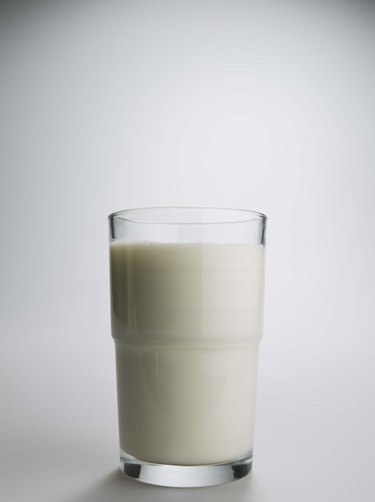
A cold glass of milk invigorates your taste buds and gives you a boost of calcium, but people with diabetes need to be selective with their milk choices. Milk provides important nutrients for bone health, but some varieties contain large amounts of saturated fat and sugar, which should be limited in a diabetes diet.
Milk on a Diabetes Diet
According to ''Diabetes Forecast,'' a publication from the American Diabetes Association, diabetes increases your chance of developing bone fractures, a risk that increases as you age and lose bone mass. Calcium-rich foods, such as milk, help keep your bones strong and protect against osteoporosis, a serious bone loss that can lead to broken bones and decreased mobility. Since milk contains lactose, a type of sugar, it needs to be counted toward your daily carbohydrate totals. The American Diabetes Association's nutrition plan recommends 45 to 60 grams of carbohydrates per meal, which includes one serving of dairy. Eight ounces of milk count as one dairy serving.
Video of the Day
Skim and Low-fat Milk
Diabetes increases your risk of heart disease, but you can control your risk by limiting your intake of saturated fat. One cup of whole milk provides 149 calories and 5 grams of saturated fat, but 1 cup of skim milk contains only 83 calories and 0.1 gram of saturated fat. If you prefer milk with a thicker texture than skim milk, try 1 percent milk, which has 102 calories and 1.5 grams of saturated fat per cup. All plain milk varieties provide about 12 grams of sugar per cup, but chocolate, strawberry and vanilla milk contain added sugar, so read the food label before purchasing.
Benefits of Soy Milk
If you do not like regular milk or are lactose intolerant, soy milk makes a healthy alternative. One cup of regular soy milk provides 131 calories, 10 grams of sugar and 0.5 grams of saturated fat. A study published in 2013 by the "Journal of Renal Nutrition" found that soy milk improved blood pressure in people with diabetes and neuropathy compared to participants who drank cow's milk. Unfortified soy milk provides 61 milligrams of calcium per cup, only 6 percent of the Institute of Medicine's recommendation of 1,000 milligrams a day, so look for fortified varieties in your supermarket.
Other Healthy Milk Choices
If you want to add variety to your beverages, try almond milk. One cup of fortified vanilla almond milk contains 91 calories and 451 milligrams of calcium, 45 percent of the daily value. Vanilla almond milk has 15 grams of sugar per cup, so look for unflavored varieties to decrease your sugar count. According to Seattle and King County Public Health, rice milk provides 90 to 120 calories and 2 to 3 total fat grams per cup. Calcium content also varies from 2 to 30 percent of the RDA, so read the nutrition label, and choose a calcium-rich option.
- Diabetes Forecast: Better Bone Health With Diabetes
- American Diabetes Association: Dairy
- American Diabetes Association: Heart Disease
- USDA National Nutrient Database: Milk, Whole, 3.25% Milkfat, with Added Vitamin D
- USDA National Nutrient Database: Milk, Nonfat, Fluid, with Added Vitamin A and Vitamin D (Fat Free or Skim)
- USDA National Nutrient Database: Milk, Lowfat, Fluid, 1% Milkfat, With Added Vitamin A and Vitamin D
- USDA National Nutrient Database: Soymilk, Original and Vanilla, Unfortified
- Journal of Renal Nutrition: Soy Milk Consumption and Blood Pressure Among Type 2 Diabetic Patients with Nephropathy
- USDA National Nutrient Database: Beverages, Almond Milk, Sweetened, Vanilla Flavor, Ready-to-drink
- KingCounty.gov: Nutritional Content: Rice Milk & Soy Milk